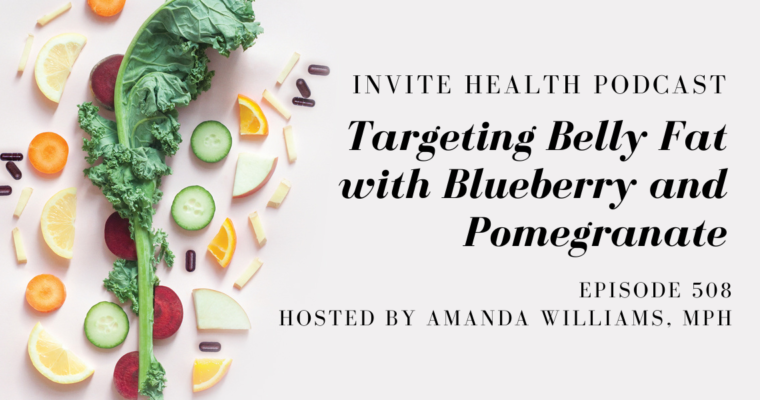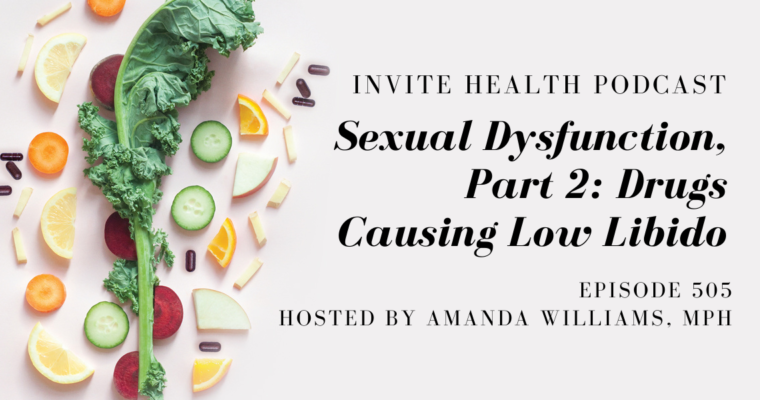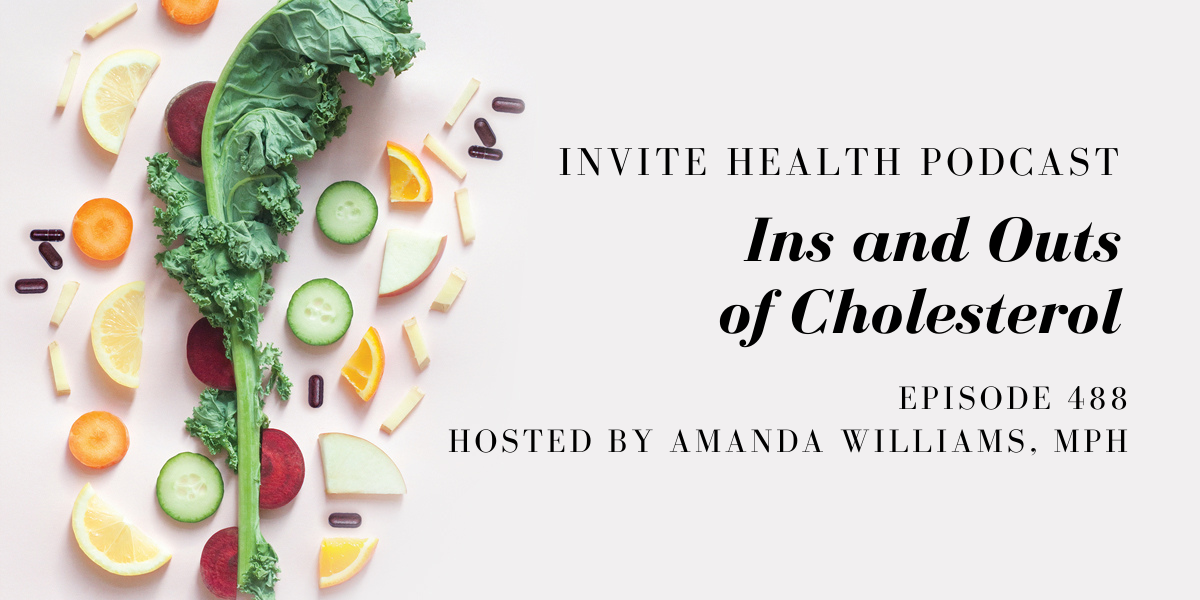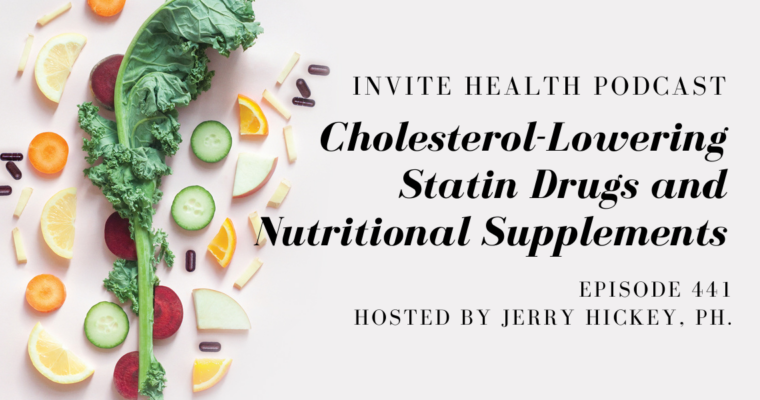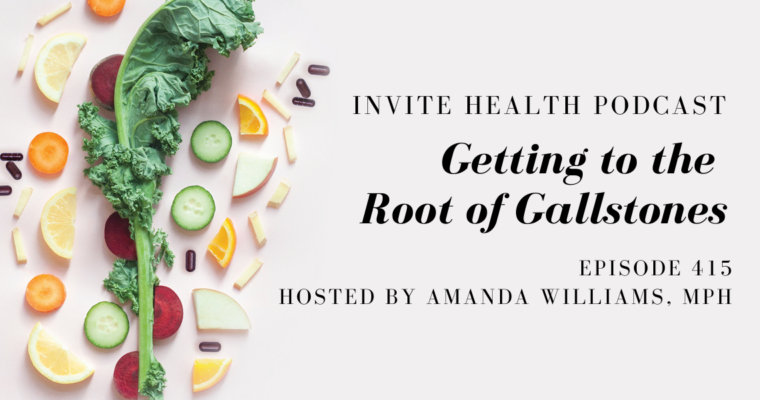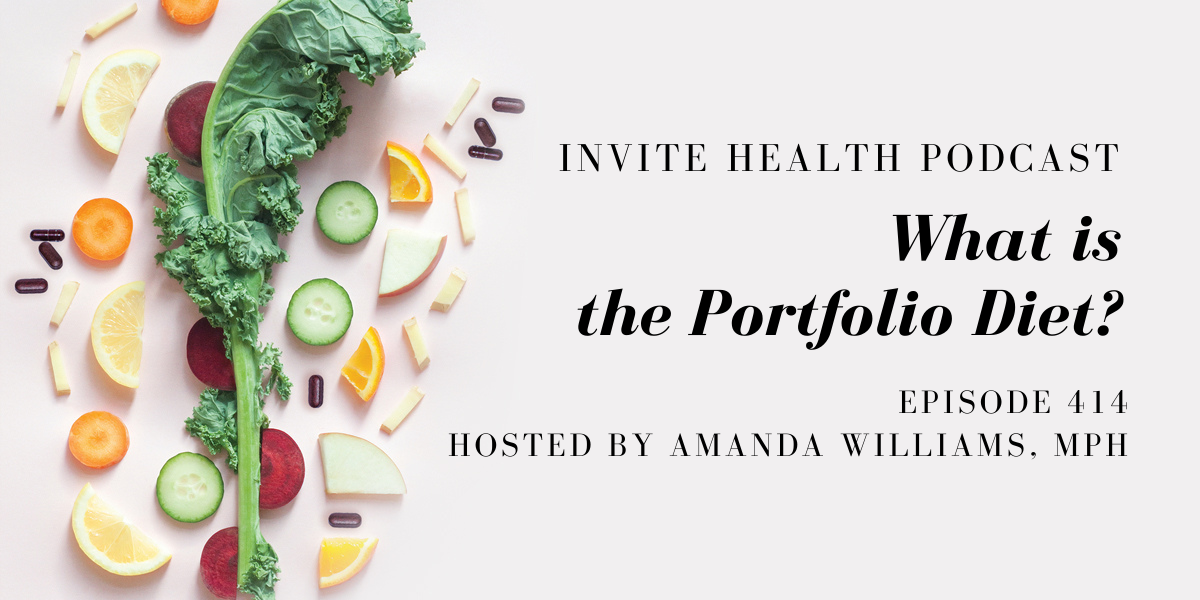Subscribe Today!
Please see below for a complete transcript of this episode.
Ins and Outs of Cholesterol – InViteⓇ Health Podcast, Episode 488
Hosted by Amanda Williams, MPH
*Intro music*
InVite Health Podcast Intro: Welcome to the InViteⓇ Health Podcast, where our degreed healthcare professionals are excited to offer you the most important health and wellness information you need to make informed choices about your health. You can learn more about the products discussed in each of these episodes and all that InViteⓇ Health has to offer at www.invitehealth.com/podcast. First time customers can use promo code PODCAST at checkout for an additional 15% off your first purchase. Let’s get started!
*Intro music*
Amanda Williams, MPH: [00:00:40] The ins and outs of cholesterol and the nutrients that can be incredibly supportive. That is what I want to talk about today. My name is Amanda Williams, MD, MPH and let’s get right to it. [00:00:52][12.5]
[00:00:53] We think about cholesterol as a whole. Cholesterol is… It’s a steroid molecule, and it is a large component of our cellular membrane, as well as being a precursor to different hormones. And we can look at Vitamin D, for example. So we know that when we’re looking at cholesterol itself, we have this waxy like steroid molecule and it’s playing this really critical role when it comes to metabolism. We look at those cellular membranes and this is why in the brain, it’s so important because when we think about membrane fluidity allowing to maintain the proper function over time, this is key. And so if we lose that protective effect, now we’re creating issues. So we can even look at myelin, for example, and we know that myelin is that protective coating with, around a nerve fiber. And we know that cholesterol is a major component of that myelin. So if we have the wearing away of myelin, which is in, say, for example, you look at multiple sclerosis, MS is… Basically it’s a wearing away of that myelin sheath. [00:02:17][83.6]
[00:02:18] So we know that cholesterol is not our enemy. We actually need cholesterol for the insulation of neurons, for the structural integrity of all of these different cells throughout the body. When we look at our liver cells and when we look at our red blood cells, I mean, these are areas in which cholesterol is very important and we oftentimes recognize cholesterol only to be bad. And when we’re thinking about bad cholesterol, we’re looking at that low density lipoprotein, so the LDL. [00:02:52][34.3]
[00:02:54] Now, having too high of LDL is certainly problematic. And also in that setting, and we’re talking levels that are, you know, well over, you know, north of 100 of your LDL. But we also have to think about the actual particle size itself, because if your LDL is packaged small and dense, that’s a bigger problem than if your LDLs are big and fluffy. So you always should have a particle test done to actually see. My LDL level might be a little on the elevated side, but is it elevated and super problematic because it’s also small? So that makes a huge, huge difference. [00:03:33][39.0]
[00:03:34] So understanding that cholesterol itself is it’s not a horrible thing. We have to have it, and we know it’s playing all these important roles. It’s this precursor to steroid hormone synthesis. Even when we look at our different sex hormones, you know, different mineralocorticoids in the body. We understand that it helps to control the balance of water and electrolytes within the kidneys. When we look at cholesterol being a precursor to Vitamin D synthesis in the body, we have to have it for bile acid synthesis, which helps for the breakdown of dietary fats, as well as for the absorption of healthy fats. So cholesterol is not the enemy, but when we have imbalances or mispackaging of cholesterol, then we have problems. [00:04:26][52.1]
[00:04:27] And then we have the triglycerides. Triglycerides are the storage form of the fat. These are very key when we think about energy utilization in the body. Now, once again, when we have excess triglycerides, this becomes problematic. And this is one of those areas once again where diet plays a big role into this, because when we think about carbohydrates, when we think about inadequate omega-3 intake… So too much bad carbs, not enough omega three leads to this excess in triglyceride production, which at the end of the day becomes a another risk factor when we think about the the impact of cholesterol in the body. [00:05:19][52.4]
[00:05:19] So you have all these different moving parts, you have the LDL particles, we have the LDL particles, you have Apo B. And the Apo B100, this is, you know, associated with your, with your LDLs and the VLDLs. And it’s a good indicator of your actual, you know, cholesterol status. So even having an Apo B100 test is oftentimes advantageous, and I always encourage people to have their oxidized LDL levels tested because we know that if there is a significant amount of oxidation occurring within those cholesterol particles, that’s a big problem as well. [00:06:00][41.1]
[00:06:01] So for many people, what happens is they get this big shift in terms of really low HDL, which is your high density lipoprotein, the cardio protective or hence your good cholesterol versus the bad cholesterol. So that imbalance already creates this scenario in which more significant vascular damage can arise and then we can get the issues with things like atherosclerosis. So all of these things are things that we are aware of, and this is why going in and just having a standard cholesterol test, that’s one thing, but it’s not giving you that full picture. So looking at the Apo B100, looking at the cholesterol particle sizes, looking at the oxidized LDLs are going to give you that fuller picture because we, we need to recognize where it is we can make those adjustments. [00:06:57][55.6]
[00:06:58] And understanding, you know, that there are so many different, as I said, moving parts to this when we look at, you know, the connection between other hormonal pathways, the thyroid, for example. And so seeing that the thyroid hormone is really involved in modulating the rate of cholesterol synthesis in the body. So if we have a thyroid dysfunction going on, this too can lead to problems with cholesterol transport in the body. So there’s so much more than just a standard, “Hey, this is your total cholesterol, this is your LDL.” We have to really get that full picture as to what is actually occurring. Looking at the, the particle numbers, looking at the particle sizes. All of these things make a huge difference because when we’re looking at the factors that contribute to cardiovascular disease, the more we know, the better we can do in terms of targeting and making those different lifestyle modifications. So we know clearly, you know, if we have an issue with high blood pressure, if we have an issue with high blood glucose, so in the setting of diabetes, prediabetes, metabolic syndrome, all of these things can become problematic because when we look at oxidized LDLs or the glycation that can occur within the cholesterol, this is going to be problematic because when you get glycated or oxidized LDLs, this actually creates a lowering of nitric oxide synthase in the body. And nitric oxide synthase is this enzyme that’s involved in maintaining the proper vasodilation and blood flow in the body. So we have oxidized LDLs. We get lowering of nitric oxide release, which means we get vascular constriction, which can drive up your blood pressure so you can start to see those interconnections. It’s not as though one thing is isolated from the other. Everything has a connection point. And so when we’re thinking about cholesterol, we have to be able to draw those links. We have to say, you know, the lowering of nitric oxide leads to vasoconstriction, which leads to high blood pressure. [00:09:19][141.1]
[00:09:20] We also recognize that the small dense particles can create vascular damage, which leads to this plaque buildup or atherosclerosis, which once again drives up inflammation and can create a problem with proper blood pressure. So making the the lifestyle modifications… Adherence to a Mediterranean Diet where you’re getting a greater intake of things like those omega-3 fatty acids, high fiber, which is certainly important when we think about cholesterol and we know that the average American is significantly lacking fiber in their diet. Why? Because they don’t take in fruits and vegetables. They’re not eating things like seeds and nuts throughout the day or eating potato chips, and they’re having a, you know, sandwich with processed deli meat on it. I mean, all things that are driving up blood pressure and not doing a darn thing when it comes to trying to help the cholesterol transport properly throughout the body. So we have to be wise. [00:10:28][68.8]
[00:10:29] And we know that when it comes to, you know, standard treatments in traditional medicine, you know, statins are kind of the go-to. And we know that the way that the statins are working is through the reduction of cholesterol production in the body, and it does this through a particular pathway. So the way that cholesterol is being processed or produced in the body, there is an enzyme which is known as HMG-CoA Reductase. So if you inhibit that, that is going to create a situation where the body is not making that cholesterol, which is a good thing if we have too high of cholesterol. But the cost to that is through the blockade of HMG-CoA Reductase, we are also potentially creating a problem with proper coenzyme Q10 production, which is why when someone is on a statin medication, it is so important that they are also taking CoQ10 Ubiquinol very key to this. And we also know that with the statin drugs, they may do one thing they can lower cholesterol, but they can also create other problems and they can create an issue with, you know, elevated liver enzymes, which is why when someone’s on a statin medication, they have to go in and have their liver enzymes tested from time to time to make sure that we’re not getting a inflammatory issue going on within the the liver itself. So all of these different things that that we’re aware of. [00:12:10][100.8]
[00:12:10] We know that there are other medications out there. Cholestyramine, for example, which are bile acids sequestrants and they help to try to, to blockade the, the fats from being absorbed in the first place within the intestines. So a lot of different medications that are out there that doctors generally will turn to. And of course, we now know that many doctors are on the bandwagon of, “Hey, omega-3 fatty acids are pretty important. Maybe we should be prescribing these.” And now that there are prescription fish oils, doctors are all over that and they are just like their big advocates of omega-3s. And hey, if it took them a while to get there, that’s fine. But just keep in mind utilizing the InVite Health Fish Oil, utilizing the InVite Health Krill Oil Advanced, those are wonderful sources of your omega-3 fatty acid that are when we’re looking at the prescribed fish oils are comparable. So we use such a clean source and it goes for that double distillation process, so you’re removing any of those impurities that the fish itself may have been exposed to throughout its life before it’s made into a fish oil. This is really important. And so this is why I always include omega-3 fatty acids into anybody’s daily routine, regardless of what your health concerns are. We know that our diet itself does not yield enough exposure to the omega-3 fatty acids. So all of these different things. [00:13:51][100.6]
[00:13:51] We know that, you know, garlic has been shown to be incredibly beneficial when it comes to targeting oxidation of those LDL cholesterols and helping to support healthier cholesterol production in the body. So, you know, we can include salmon into our diet. We can have garlic into the diet. There are so many different ways that we can optimize natural support to maintaining healthy cholesterol. [00:14:19][27.9]
[00:14:20] But then we also want to look at things such as tocotrienols because we know that the tocotrienol form of Vitamin E very much so works in the same mechanism as those statin medications in terms of that impedance or the targeting of HMG-CoA Reductase. So remember, with the statin drugs they’re blocking HMG-CoA Reductase so that the cholesterol can’t be produced. Well, we know that Vitamin E naturally is doing this. And but, because Vitamin E is an antioxidant and it’s supporting the, you know, amount of coenzyme Q10 in the body, utilizing the Tocotrienol with Pine Bark Extract is a really nice way for people who maybe are intolerant to statin medications. Maybe you’ve been given a statin drug and you just don’t do well on it because it creates muscle cramps or you just feel like you have no energy because it’s wiping out your CoQ10. Looking at the Tocotrientol with Pine Bark Extract is an excellent alternative for you, or you can even use it in combination. So say you are on a cholesterol-lowering medication and you’re doing fine on it. You want to stay on it, but you also want to, you know, increase your antioxidant capacity in the body. Adding in that Tocatrienol with the Pine Bark Extract is a very, very good idea because we also know that that pine bark extract, that maritime pine bark extract, is incredibly supportive when it comes to the lining of the blood vessels. So where we have the endothelial dysfunction that is created or stiffening that occurs within the endothelium, the pine bark extract is very targeted towards that, and it helps for really fending off a lot of the oxidative stress that drives up the endothelial thickening, as well as that endothelial stiffness. So Tocotrienol with Pine Bark Extract, it is wonderful for our hair. So for those who have concerns about maybe, you know, the hair is thinning out or male pattern baldness or women, you know, pattern baldness, any of these things, the tocotrienols… And the form that we use, it’s a registered trademark form. It is highly absorbable. It is very targeted towards oxidation that is created within your bad cholesterol. But we also know it does a wonderful job in terms of the internal support for that hair shaft itself. So for really allowing for fuller, thicker and healthier hair, the Tocotrienol with Pine Bark is a really good option for you. [00:17:09][168.7]
[00:17:09] But now I want to talk a bit about the Sterols and the Sterols Plus. We know about plant sterols is that they are their steroid compounds. So what else do we know is important when we think about the steroid compounds? Cholesterol, so cholesterol. So a sterile is a plant-based compound. Now very similar to cholesterol, they exist as these free molecules, and they are very, very supportive when it comes to the management of cholesterol in the body. The sterols themselves are working in a means for the, in a sense, kind of a binding of the, the elevated LDL. And so when we look at the science behind that… So when people have a high amount of plant sterols in their diet, so we think about those fibers in those stairwells, it does a really lovely job in terms of reducing cholesterol in a natural way, and it is doing this via the cholesterol transport process that occurs within the liver. [00:18:23][73.9]
[00:18:23] Now one of the issues is that we know just from, you know, dietary intake that the sterols sometimes aren’t absorbed exactly adequately within the intestines. And this is for a multitude of different reasons. We can look at chronic inflammation that’s occurring within the GI tract. We can certainly look at just not enough exposure to the plant sterols from our diet itself. We know that that’s clearly an issue for most people. So this is why taking these sterols as a supplement is a really good choice. So we know that the FDA has actually approved a true health benefit claim, saying that foods that contain those plant sterol,s when we take them in on a regular basis, can be used as a means to lower cholesterol and may reduce the risk of heart disease. So this is why we always go back to why it’s important to have fruits and vegetables in your diet on a regular basis. [00:19:35][72.0]
[00:19:36] So I want to talk a little bit about some of the science behind the sterols themselves, because when we start to really understand how it is that the plant sterols are working for the management of blood cholesterol levels, we can go all the way back to a study that was done at the Mayo Clinic in the early 2000s, and this was published in the Mayo Clinic Proclamations Journal. And what they were looking at was a meta analysis of over 41 different clinical trials that showed that the intake of plant sterols via supplementation reduced LDL cholesterol levels by upwards of 10%. So they said, not only eating foods that, you know, were high in fiber, low in bad fats, but also having this higher exposure to the plant sterile, that combination can reduce the LDL levels alone by over 20%. So adding in those plant sterols is, in their opinion, and this was the Mayo Clinic in 2003, just as effective as if someone were on a statin and they kept increasing their statin dose. So they said just taking the plant sterols alone is showing these benefits. [00:21:04][87.4]
[00:21:05] So in the journal Atherosclerosis, they are looking at plant sterols in the management of high cholesterol, as well as the prevention of cardiovascular disease. And this was done through the European Atherosclerosis Society, where they were looking at that evidence that was relevant when it came to adding in plant sterols as a component of your healthy lifestyle to reduce overall cholesterol, in particular, looking at the LDL, the bad cholesterol. And they found once again plant sterols. Supplementation of plant sterols causes significant inhibition of that cholesterol absorption and lowers LDL levels. Once again, just adding that in to the daily routine can lower that cholesterol by upwards of 10%. Now, the reason why this is important is because the more that we can manage that, the bad cholesterol, the better off we are in terms of overall cardiovascular protection. Because remember, it’s that bad cholesterol over time, the way that it’s packaged, the fact that it’s oxidized, that creates that significant damage within those blood vessels themselves. So if we’re regulating that cholesterol from even building up in the first place, now we’re lowering that risk of future cardiovascular disease. [00:22:34][88.5]
[00:22:35] And so this is part of the Sterols Plus formulation. You are getting the plant sterol in combination with red yeast rice, in combination with cranberry extract. So we have that cranberry extract to help to support your antioxidant-fighting capacity, so to fend off free radicals. We know that cranberry extract are packed with those proanthocyanidins that really help to optimize healthy circulation, so even when we’re thinking about blood pressure, for example. So we have red yeast rice, the cranberry extract, the plant sterols in this and there is oat beta glucans. Now oatl beta glucans, this is a fiber that comes from the oat bran itself, and it has this really finite ability to bind onto cholesterol. So when we’ve all heard about the importance of eating oatmeal and how oatmeal can help with your cholesterol and it’s a heart healthy food, well, this is the reason why we’re looking at that actual beta glucan, and we know that the body itself doesn’t produce beta glucan. So the only way that we’re getting this is through outside sources from things like mushrooms, for example, and that we just talked about the importance of mushrooms and brain health. But we also know that oats is a wonderful source of that beta glucan. [00:24:07][91.9]
[00:24:08] So let’s look at a study that was published in the Journal of the American College of Nutrition back in 1997, looking at the impact of beta glucan coming from oats on blood lipid levels. So they took a group of men and women who had elevated cholesterol, and they gave them beta glucan for just five weeks. So this is a relatively short study. So just five weeks of incorporating in beta glucan and they were assessing their good cholesterol, the HDL. They looked at the bad cholesterol, the LDL. They looked the VLDL, which is the very low density lipoprotein. They were looking at their triglyceride levels. And they found that just through the incorporation of adding in that oat beta glucan, that there was a beneficial reduction of cholesterol. They found a significant dose response of beta glucan concentration. So they found that when the people who were taking the beta glucan at the right amount based off of their study that in just five weeks they had this significant downward shift. So. It makes a lot of sense. And when we think about not only the benefit that goes along with the cholesterol, we also have to look at how that’s helping to enhance and improve our glucose and insulin response, which is why the American Journal of Clinical Nutrition also looked at how dietary intake of oat beta glucan was not only supportive in the management of cholesterol, but it actually helped to support better glucose and insulin response. So it helped to enhance insulin sensitivity at the same time lowering excess glucose throughout the body. [00:26:08][119.9]
[00:26:10] So study after study showing the impact of those oat beta glucans when it comes to our management of cholesterol, but at the same time helping to support healthy blood sugar response, and we know that there’s that connection between the bad carbohydrates, glycation triglyceride production, bad cholesterol, damage to vessels. You can start to see how everything is interrelated. So by incorporating in the oat beta glucan coming from the Sterols Plus formula, along with getting the plant sterols, along with getting those proanthocyanidins from the cranberry, you can now start to really connect those dots. [00:26:54][44.4]
[00:26:55] And then, to boot, we add in the red yeast rice and we know that red yeast rice has been around for a very long time, and we know that certain statin drugs are actually made on the backbone of red yeast rice. So before there was ever a statin, there was red yeast rice, and we know that so many different clinical research studies out there have shown that red yeast rice reduces high cholesterol and being able to see study after study, you know. UCLA School of Medicine looking at the impact of red yeast rice rice over a three-month timeframe showing how it lowered total cholesterol, lowered LDLs, lowered triglycerides, helped to increase the good cholesterol. We know that the American Heart Association has shown their findings of so many different studies showing that red yeast rice is a really good alternative for people who are statin intolerant. [00:28:04][69.1]
[00:28:07] Now, when we partner up red yeast rice with a Mediterranean Diet, we are really creating this wonderful way to optimize our cardiovascular system. So in the Journal of Evidence-Based Complementary and Alternative Medicine, they were showing how your blood cholesterol levels can be modified just through the Mediterranean Diet. But when they add it in additional red yeast rice, that this had this really enhanced lipid lowering ability. So they took a group of people who were statin intolerant, meaning they couldn’t take Crestor. They couldn’t take Lipitor because of side effects. But they also had other factors. They had high blood pressure. They had type two diabetes, and they said, “Well, let’s give them red yeast rice and let’s put them on a Mediterranean diet. Let’s look and see what’s actually occurring. And let’s look at their liver enzymes. Let’s look at their triglyceride levels.” And at the end of the study, what they found was that that combination of the Mediterranean Diet, along with that coadministration of red yeast rice, improved those patients who were statin intolerant could not take the prescribed medication for their high cholesterol. This improved their cholesterol levels much more. That combo, red yeast rice along with that Mediterranean Diet, and it showed significant improvement when it came to the management of their type two diabetes. So we know all of these things, we know that doctors are becoming more and more aware of the fact that many patients who are put on medications maybe experienced significant myalgia or pain within the muscles. And so they’ve always been looking for an alternative. Well, the alternative is not something new. The alternative is where the statin drugs started from, started from red yeast rice. So they’re kind of just going back to the basics and they’re saying, “OK, let’s utilize red yeast rice.”. [00:30:13][126.1]
[00:30:14] And seeing this time after time again. University of Pennsylvania School of Medicine. They put out an article in the Annuals of Internal Medicine showing that that hey, when we have patients who can’t be on a standard medication, the very first thing that we should be doing is putting them on red yeast rice. So when you’re using the Sterols Plus formula, this is what you’re getting. You’re getting that combo of red yeast rice along with those powerful plant sterols, along with the power of those proanthocyanidins coming from cranberry, along with the oat beta glucan. It is probably one of the most comprehensive ways for you to target all different aspects of the way cholesterol can go haywire in the body. So when you think about the oxidation of the LDL, when you think about the elevation of the triglycerides, when you think about the overproduction of cholesterol. The Sterols Plus formula is targeting each and every single one of those pathways and those different processes that leads us down that road to having harmfully high levels of cholesterol and at the same time, that elevated risk for a cardiovascular event. So the Sterols Plus, absolutely fabulous formulation. [00:31:38][84.2]
[00:31:38] We also have our Red Yeast Rice just by itself. So say, for example, you’re already adhering to a Mediterranean diet. You are taking your omega-3 Fish Oil from InVite every day and you just want to add in another added benefit for that support of healthy cholesterol transport. Then you can just take the Red Yeast Rice just by itself. So that is all that I have for you for today and the ins and outs of cholesterol. I want to thank you so much for tuning in to the InVite Health Podcast. Remember, you can find all of our episodes for free wherever you listen to podcasts or by visiting invitehealth.com/podcast. Do make sure that you subscribe and you leave us a review. You can follow us on Facebook, Twitter and Instagram @invitehealth and we will see you next time for another episode of the InVite Health Podcast. [00:31:38][
